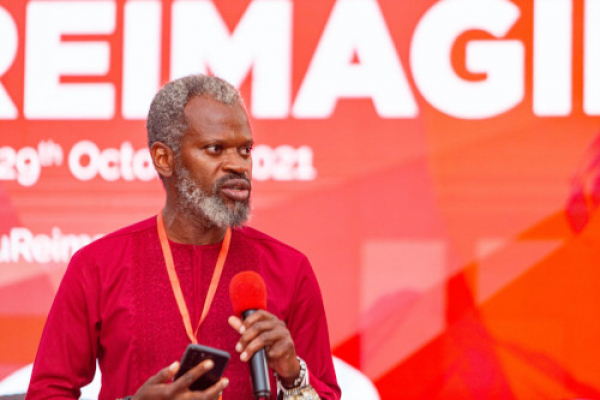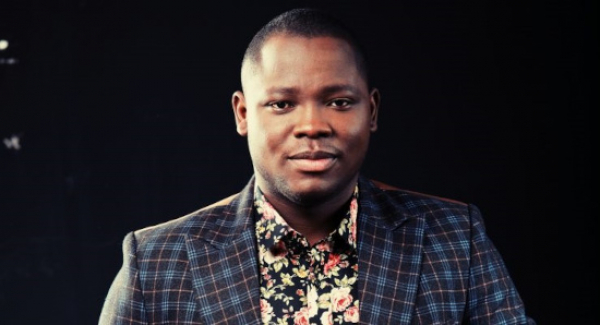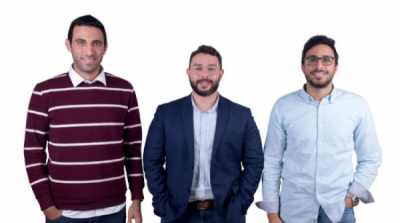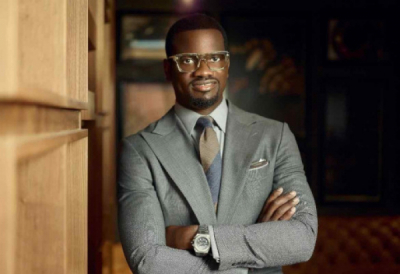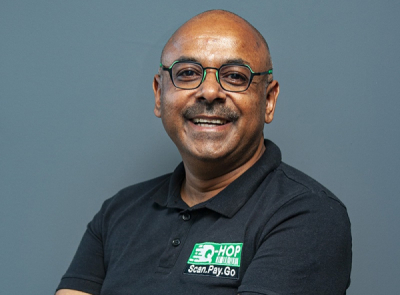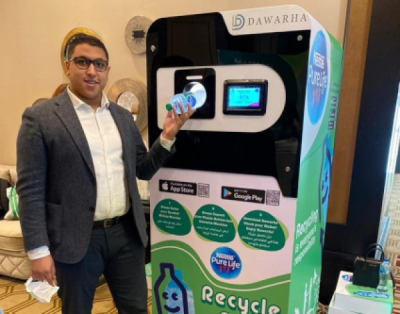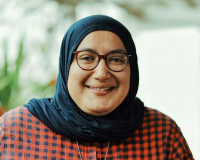
TECH STARS (1006)
Jonh Kamara created his platform to save millions of Africans from his painful experience. The platform aimed at helping reduce misdiagnosis cases in Africa earned him the confidence of several investors, who have committed funds for his expansion phase.
Tech veteran John Kamara (photo) is the founder of AfyaRekod, a healthtech combining artificial intelligence and blockchain technology to store users’ health information. With 20 years of professional experience in various fields like gaming, e-commerce, and telecommunications, the Kenyan entrepreneur is now committing his expertise and energy to guarantee better healthcare for patients across Africa.
In fact, he created AfyaRekod in 2020, following the demise of one of his close friends in Lagos, Nigeria. “...My friend was diabetic. But that wasn’t enough to kill him. He was rushed to the hospital with a seizure, and the doctors treated exactly what they saw. They were blindsided because they had zero idea of everything that happened before he got there,” Kamara told TechCabal explaining the origin of his platform.
His platform collects and securely stores users’ health data. That way, anytime those users are taken to a hospital, doctors can check their health history via the AfyaRekod app or a USSD code for informed decisions.
In February 2022, the startup raised US$2 million from notable investors, including Japanese Next Chymia, to upgrade its product offering and enter new African markets.
Apart from the health industry, John Kamara is also active in the gaming industry. In 2020, he co-founded ADA Animation, with Joy Mwangi. Through ADA Animation, the aim is to “build capacity in the animation industry, tell animated African stories and catalyze the animation industry for growth.”
He began his professional career as director of business development of the US tech firm Sun Microsystems. From there, he went on to become director of strategy for Google. He also served many internationally renowned firms on several continents. From 2014 to 2018, he served as the Director of Digital Growth & Development for Global Gaming Africa. He is currently the Director of Strategy at the Data-Driven Innovation Center at the Nelson Mandela African Institute for Science and Technology (NM-AIST).
Melchior Koba
Within four years, he was able to position FedaPay, the startup he co-founded, in several African markets. His ambition is to conquer the whole African market.
Benin-born Hermann Aguessy (photo) is since January 2022, the CEO of FedaPay Niger, the Nigerien subsidiary of the startup he co-founded five years ago with Boris Koumondji.
The startup, which offers payment aggregation solutions, is already present in several African countries, including Benin, Togo, Côte d'Ivoire, and Senegal. However, its aim is to improve its offers and boost financial inclusion in the continent. It intends to first cover the whole of Francophone Africa, by entering additional markets like Burkina Faso and Cameroon.
With its eponymous solution, FedaPay aims to offer clients a handy tool, the only one they will need to collect payments.
“Users can now accept Visa, Mastercard, and mobile money payments through FedaPay. The platform can be useful for -commerce actors and everyone accepting payment online or through mobile/web apps,” Hermann Aguessy said in January 2022 after raising expansion funds through the Benin Business Angel Network (BBAN).
In 2012, the co-founder completed his Master’s of Computer Science at the University of Abomey-Calavi, Benin, and joined the International Organisation of la Francophonie as an IT manager. A year later, he co-founded tech lab BLOLAB while at the same time pursuing an IT service management certificate at the ITIL Foundation.
In 2014, he returned to Benin as head of the IT department of Polytechnic School of Abomey-Calavi (EPAC). Months later, he founded Nautilus Technology, a computer engineering firm, and held management position (until 2018) at DUCIEL Sarl, an international trading firm.
With FedaPay, Hermann Aguessy earned several government recognitions. In May 2021 for instance, he received a XOF23.4 million (US$38,000) grant from Benin’s Digital Entrepreneurship Support Fund. His startup has also been commissioned by the National Agency for the Identification of Persons (ANIP) to collect payments for its services.
Melchior Koba
During his professional career in various financial institutions, he identified a number of weaknesses in funding requests. To remedy those weaknesses, he combined his expertise with the tech skills of his partners to build Xpovi.
In March 2022, the Egyptian tech ecosystem became aware of the existence of Mohamed Marei (photo, center) with the US$300,000 seed funding he raised from angel investors. The fundraising operation was concluded just 10 months after the techpreneur launched Xpovi for Digital Solution LLC (Xpovi), the startup which developed a web-based Robotic Advisory Software
Co-founded by Mohamed Marei, Mostafa Hisham, and Taher Seif, Xpovi provides autonomous business process management services to early-stage startups by using artificial intelligence and machine learning. It thus helps them develop the effective business plan they need for their development.
For Mohamed Marei the aim is to help save time and costs for new entrepreneurs who can not afford to hire professionals for the development of their growth strategy.
“We seek to revolutionize financial and business advisory, to enable planning, monitoring, and decision-making supported by instant-based analysis and data-driven recommendations,” he explains.
Xpovi is the result of the weaknesses identified by Mr. Marei in most funding requests over his more than eight years of professional experience in investment banking. His professional career began in 2012 when he became an account payable intern for food and drink processing conglomerate Nestlé. Months later, in July 2013, he assumed the position of financial comptroller at Emirates NBD Bank.
From 2014 to 2015, he was an equity analyst for Cairo Financial Holding before joining Prime Holdings as an equity research analyst (2015 to 2016) and senior equity research analyst (2017 to 2018). In 2018, Mohamed Marei became the associate Vice-president of Beltone Financial where he spent just months before returning for a brief stint as deputy head of research at Cairo Financial Holding. Some two years later, he joined Catalyst Partners Egypt as a senior associate but left in 2021 to found Xpovi.
Melchior Koba
Bode Pedro is the real definition of a serial entrepreneur. With fifteen years of professional and entrepreneurship experience, he has already founded five firms. Yet, given his love for technology and innate curiosity, it wouldn’t be surprising to see him start more businesses.
Nigerian serial entrepreneur Bode Pedro (photo) founded insurtech Casava in 2016 with Segun Makinde. With over 66,000 clients in Nigeria, the insurtech offers digital microinsurance services.
In February 2022, Pedro described his startup’s mission as follows: “provide affordable insurance to Nigerians and Africans in general.” As such, the startup plans to expand its client base, first in Nigeria then gradually expand in Africa.
To finance this expansion, Casava’s founders raised, last February, US$4 million from several investors like Olivier Jung, Tom Blomfield (founder of Monzo), Ed Robinson and Brandon Krieg (founders of Stash), in a round led by Target Global.
Bode Pedro holds a Master’s in Business Administration from Harvard Business School (2020). A few years earlier, he obtained a computer science degree from the University of Baltimore. In 2005, he began his career in the U.S. as the associate director of entertainment firm Amplifyd Entertainement Inc. The next year, he became the director of Transnational Technologies, a U.S based electronics manufacturing firm.
In 2008, Pedro returned to Nigeria and launched Veda Technology, a computer assembly firm. Two years later, he became the boss of online entertainment platform BellaNaija, and in 2013 he founded Tripican.com, a movie ticketing platform. In 2014 and 2016 (the year in which he founded Casava), he founded VisaCover, an insurtech, and online car insurance broker, and Motocheck, a vehicle inspection, and maintenance company in Nigeria, respectively.
Also, since 2021, he is the MD of Rex Credit Company Private Ltd and a member of the board of Octosoft, a healthtech that leverages artificial intelligence for its health solutions.
Melchior Koba
The accounting graduate started in the finance industry but later entered the tech world when the need arose. His choice earned him client recognition as well as clients' and investors’ trust.
South African entrepreneur Ajay Lalu (photo) is the CEO of tech firm Consumption Information Real Time (CIRT), which helps businesses improve operational efficiency with Internet of Things (IoT).
CIRT, which Lalu co-founded in 2018 with Sanjay Soni, has already introduced several solutions in the local market. They include Fridgeloc Connected Cooler, which monitors temperature and remotely controls air conditioning generators, and Q-Hop, which facilitates contactless and cashless shopping.
In January 2021, the IoT firm announced a multi-year strategic alliance to receive “technical guidance, support and access to engineering resources, business development resources” from Microsoft and integrate its solutions to Microsoft Azure.
In March 2022, CIRT’s dynamism in South Africa’s highly competitive business technology market enabled Ajay Lalu to raise ZAR7.2 million (US$460,000) from E Squared Investments to develop its activities, implement pilot projects and grow its development team.
Ajay Lalu graduated from the University of South Africa (UNISA) in 1996 with a BSc in Accounting and started his professional career in the finance and accounting sector. In 2000, he joined Ernst & Young as a corporate finance manager. He continued his professional and entrepreneurship career in the finance sector till 2010 with firms like Utajiri Investment Holdings and Bravura Economic Empowerment Consulting, which he founded in 2006. At the time, he was not much interested in venturing into the tech world since there was virtually no market. In 2010, he joined the sustainable development consulting firm Black Lite Consulting as its MD. Eight years later, while still operating as Black Lite Consulting’s MD, he launched CIRT.
In 2020, he got a professional IoT certification to be able to fully contribute to the success of CIRT client firms.
Melchior Koba
In Egypt, there was no plastic bottle collection and recycling system despite the estimated 5.4 million tons of waste generated in the country yearly. To address the situation, Dawarha created a solution that allies mobile apps with AI-based collectors. With the solution, Dawarha collects around 15,000 plastic bottles monthly.
Egyptian tech firm Dawarha is carving its name in its origin country with its artificial intelligence-based plastic recycling machine. For mechatronics engineer Mohamed Kabil (photo), Dawarha CEO and co-founder, the recycling machine is the startup’s contribution to the fight against plastic pollution.
To get the population involved in the fight against plastic pollution, the said solution rewards every user who deposits plastic bottles with bottled water, vouchers or discounts to be used in local stores.
Dawarha also developed an app that allows users to locate the nearest collectors. According to Mohamed Kabil, Dawarha was created to address the lack of sorting and recycling infrastructure in Egypt where an average of 5.4 million tons of waste is generated yearly.
He explains that in Western countries like Germany where he took pre-masters courses, catering companies are in charge of plastic bottle collection via a national deposit system. “... Companies add extra fees to the price of the bottles available for sale at retailers. Customers can [be] refunded the extra fees when returning the bottles at the local shop or retailer,” he stressed.
“This [system] does not exist here, so people tend to be more encouraged to recycle waste when they are rewarded. Therefore RVMs are found to be one of the most effective methods of waste collection and separation from the source,” Mohamed Kabil added.
The research and development enthusiast, who worked from 2018 to 2019 as a researcher at the Micro and Nano Robotics Laboratory at the German University in Cairo, believes that technological innovation has an important role to play in protecting the planet.
In April 2022, he estimated the volume of bottles collected by Dawarha's system monthly to be around 15,000.
Melchior Koba
Her startup was founded to save Egyptians from her difficult experiences. Combining her digital marketing skills with her passion to serve the population, she developed a mobile app used by 75,000 people in Egypt.
Doaa Aref (photo) is the co-founder and CEO of Chefaa, a healthcare startup she launched with Rasha Radi in 2017. Chefaa allows users to discuss with pharmacists, through a mobile app available on AppStore and Playstore, scan their medical prescriptions to order the drugs they want to buy, and get them delivered to their doorsteps.
Currently, the startup claims 75,000 users in Egypt. To develop its services and enter new markets, Doaa Aref launched a fundraising operation that brought in several investors including Newtown Partners, Global Brain, and GMS Capital Partners. The amount raised was not disclosed but Doaa Aref is confident about the impact the funds would have on Chefaa.
“I believe this venture round is pivotal not because it will only help us scale our validated business models, but because it will also help us capitalize on untapped market opportunities. We are confident Chefaa will dominate over a much larger market share in the next two years,” she said.
Chefaa was created to save users from the tribulations Doaa Aref went through at one point in her life. Indeed, when she was diagnosed with thyroid cancer, she had a hard time traveling to get her medications, as she was living alone, and even accurately following the treatment plan.
"I passed through many problems, I really didn’t know how to handle medicine. And when I got better and started to do some market research I found out that everyone literally has these problems. We need a solution. That’s how I got the idea for Chefaa," she explained.
No one would have guessed Doaa Aref would go into the healthtech industry. In 2008, she graduated from Tanta University with a BSc in Agricultural Sciences. In 2010, she enrolled in Alexandria University where she got her diploma in quality control in 2012. In 2013, she got her MBA in business Administration and Management from the Arab Academy for Science, Technology, and Shipping. Despite her various diplomas, she was more attracted to the marketing world.
From 2006 to 2012, all through her university studies, she held various marketing positions for firms like Mega Trade Co, Radwty For Advertising Services, Just4arab E-Magazine, and Maven Agency For Advertising Services. In 2015, she decided to get proper digital marketing training with the Digital Marketing Training Center, where she got a social media diploma. Up till her sickness and subsequent creation of Chefaa, she held digital marketing positions with Seven Agency, Mnbaa, Speakol, and Stylish Eve, among others.
Melchior Koba
Given his training, one would expect Hossam Taher to create a healthtech, not an edtech. However, his choice proved well-founded as he is now trusted by several investors who are committed to the development of ORCAS.
Hossam Taher is a young Egyptian entrepreneur, CEO, and co-founder of ORCAS, a startup that networks parents and students with nearby tutors through its eponymous mobile app.
Founded in 2018, ORCAS allows tutors to offer quality training to students in elementary, middle, and high schools with personalized learning plans and assessments. It is “currently working on growing (..) to become the biggest school in terms of hours taught in the world by operating in developing countries on K-12 students,” as Hossam Taher puts it.
To fulfill its ambition, the startup co-founded by Amira El Gharib successfully raised US$2.1 million, on January 16, 2022, during a pre-Series A round led by NFX Ventures and Access Bridge Ventures.
Thanks to the funds raised, Hossam Taher plans to add more features to ORCAS, attract more talents and expand into the Middle East, North Africa, and Pakistan (this year, it is expected to launch operations in Lahore).
ORCAS was previously CairoSitters. It was founded in 2014, months before Hossam Taher graduated from Cairo University with a BSc in Medicine. From 2014 to 2016, CairoSitters was an “online virtual platform where parents can find, book and manage sessions with high-quality babysitters and tutors.” It was an avenue to offer flexible work opportunities to university students and above all fill the demand for qualified and trusted tutors.
To address the specific needs of every student, CairoSitters was rebranded as ORCAS with more offers. “Learners today have different needs that edtech companies must cater to. For that reason, we have evolved into a learning platform that offers the complete spectrum of teacher-led & self-paced learning environments,” Hossam Taher explains.
Melchior Koba
After some 20 years of professional experience in the toy industry, Amir Shenouda returned to Egypt to implement a decade-long project, mumerz.com.
Amir Shenouda (photo, left) is the CEO of mumerz.com, an online shopping platform selling items specifically dedicated to mothers, babies, and children under 12 in Egypt. It offers a wide range of products in several categories, including food, clothing, toys, accessories for mothers, etc.
The platform was launched in 2021, by Amir Shenouda and Nadia Gamal Al-Din (photo, right) after a decade-long maturation that started in 2011. That year, Amir Shenouda joined, as a business development manager for mumzworld.com, which is also an e-commerce platform dedicated to mothers and babies in the United Arab Emirates, Saudi Arabia, Qatar, Bahrain, Oman, Jordan, and Lebanon.
While working for mumzworld.com, he got the idea to leverage the experience he acquired while working for U.S. toy manufacturer Toys“R”Us to create a mumzworld.com-like platform that would be focused on the Egyptian market.
He later left mumzworld.com to join Cartoon Networks as Retail Business Manager (from 2013 to 2014). From 2014 to 2018, he was a senior regional manager for Amazon’s Toys and Babies department, and from 2018 to 2021, he was the e-commerce director of Toy Triangle LLC, a Dubai-based toy store. In July 2021, after years of evaluating the market, he decided to launch mumerz.com.
Months later, on March 1, 2022, the entrepreneur successfully raised US$1.2 million in a pre-seed round, led by DisrupTech Ventures, to develop its market offerings.
Melchior Koba
For about two years now, Simon Ward has been contributing his over 20 years of experience in the fintech and e-commerce industries to improve South African workers’ financial health. He gives them tools to reduce their debts and increase their savings.
Floatpays is a money management app launched in 2020 by tech enthusiast Simon Ward (photo). With over 20 years of experience as an entrepreneur and business leader in the fintech and e-commerce industries, Simon Ward has always wanted to make a positive impact on the living conditions of local populations in South Africa. The mechanical engineer graduated from the University of Cape Town and obtained an operational management certificate from the University of Derby in England. He has been one of the chief technology officers of the photo-printing firm PhotoBox. He has also been a chief technology officer for Prodigy Finance, a financial institution that provides loans to international master's students.
For the serial entrepreneur, Floatpays was born from his desire to lift Africans out of poverty by helping address the usual cause of that phenomenon: poor financial management. Financial education and budget planning are the essential skills needed to avoid unnecessary spending, he believes. To illustrate his point of view, he indicates that in his native country, South Africa, 75% of employed people spend their salaries before month-end, and more than 50% of them end up taking loans to survive.
His digital solution helps companies improve their employees’ financial health. Once deployed, it allows employees access to the accrued but yet to be paid salaries at any point of the payroll cycle. They can thus avoid taking loans and use the accrued earnings to cover their needs. Floatpays also offers employees flexible savings solutions by allowing them to change or stop their monthly contributions, or deposit funds into their savings accounts right from their phones.
“I launched Floatpays in 2020, as a social impact-driven business on a mission to help move employees out of bad debt cycles and into a savings culture. We educate employees on financial matters, support them with financial planning, and remove the need for any employee to reach out to payday lenders/high-interest credit solutions when mid-pay cycle liquidity becomes a problem,” says the founder and CEO.
In January 2022, Floatpays completed a US$4 million funding round to develop operations nationwide and initiate its African expansion.
Melchior Koba
More...
Dumisani Kaliati has been working since 2015 to improve the living conditions of rural populations in Malawi. This year, his expertise helped the UNICEF speed up disaster assessment and assistance planning.
Dumisani Kaliati (photo) is an Information Science and Technology graduate from the University of Malawi. An experienced hardware and software developer and computer-aided designer, he founded MicroMek, a drone manufacturing startup at the age of 21. To manufacture its drones, MicroMek uses 3D printed parts and recycled materials. Dumisani Kaliati is also the co-founder of Peza, a platform connecting informal service providers with potential clients.
He got the MicroMek idea in the third year of his information science and technology study after noticing how difficult it was for people living in remote areas to access healthcare institutions. He then developed a medication reminder, which was still not addressing the challenges faced by rural populations. In 2016, while the Malawian government was vulgarizing drone usage, he decided to leverage the technology to address the challenges identified.
In 2017, he was trained on how to use drones during a workshop organized by UNICEF and Virginia Tech University. Since then, in collaboration with Virginia Tech University's Unmanned Systems Lab, he has been developing low-cost drones for remote delivery. Called EcoSoar, the drones are designed to deliver drugs and medicines, blood samples, and vaccines to hospitals. Beyond facilitating access to healthcare, the startup also helps reduce the times needed for the delivery of diagnostics, vaccines, and medications. It also manufactures drones for environmental and aerial data collection.
According to Dumisani Kaliati, the sensing drones can travel up to 30 km for aerial mapping, while the ambulance drones can carry 1 kg of medicines and samples. Depending on the purpose, their production cost averages US$350 and $430 per unit. Currently, the entrepreneur is working on drones that can fly longer distances and carry up to 6 kg of medicine and other health products.
In February 2022, Dumisani Kaliati's expertise was solicited by the UNICEF for the assessment of damages caused by Tropical Cyclone Ana in late January. The disaster wreaked havoc in Southern Malawi causing huge human, material, and agricultural losses.
Using his drones, the entrepreneur sped up the assessment, ultimately assisting in the planning of response activities.
With MicroMek, he garnered several awards, including the Malwai ICT Innovation Award's Top Entrepreneurship category in 2017. A year later, he was selected for the Mandela Washington Fellowship for Young African Leaders, where he had the opportunity to train in business and entrepreneurship at Northwestern University in Evanston, USA. In late March 2022, he took part in the Global Entrepreneurship Congress that brings together entrepreneurs from over 170 countries. The congress was an opportunity for Dumisani Kaliati to showcase Malawian expertise to the world.
Aïsha Moyouzame
Yemaachi Biotechnology is a healthtech company co-founded by Yaw Bediako, an experienced cancer researcher. His extensive experience earned him an affiliate membership in the African Academy of Sciences.
Ghanaian Yaw Bediako (photo) is the CEO and Co-founder of Yemaachi Biotechnology, a healthtech company based in Accra (Ghana) with offices in Washington D.C (USA). In 2011, he graduated from the Northwestern University Feinberg School of Medicine, Chicago with a Ph.D. in microbiology and immunology.
With Yemaachi Biotechnology, he turns immunogenomics, bioinformatics, and artificial intelligence into assets for the early detection and cure of cancer in Africa. The healthtech was founded in 2020, with David Hutchful, Joyce Ngoi, and Yaw Attua-Afari as co-founders.
In March 2021, it successfully raised US$3 million in development funds from investors like Y Combinator, V Square Capital, VestedWorld, V8 Capital Partners, Tencent, LoftyInc Capital Management, LifeLine Family Heritage Fund, and Ethan Perlstein.
According to Yaw Bediako, Yemaachi Biotechnology was launched to give Africa a saying in oncology and genome research, using artificial intelligence and data science.
“Creating a dataset that has the greatest genomic diversity can enable rapid discoveries that have long-term implications for cancer research, drug development, and patient care, not just in Africa, but globally,” says Yaw Bediako.
The Ghanaian CEO has extensive experience in cancer research. He is currently a research fellow at the West African Centre for Cell Biology of Infectious Pathogens at the University of Ghana. In London, he has been, for four years, a postdoctoral fellow at the Francis Crick Institute. For twelve months, he was a research assistant at the Calvin Institute of Technology in Indonesia and the Van Andel Institute in the United States.
In recognition of his commitment, Yaw Bediako was recently selected as an affiliate member of the African Academy of Sciences. He is also an executive member of the African Science Initiative, a project to network and promote African scientists worldwide.
Melchior Koba
Less than two months after its launch, Kouncel has already piqued the interest of many investors. With his online training courses, the founder wants to contribute his over five years of practical experience to making legal concepts understandable for everyone.
Ibrahim M. Saleh (photo) is the CEO of edtech Kouncel. A law graduate from the University of Cairo, he co-founded Kouncel in February 2022 to provide legal online training and courses on various topics like arbitration, corporate law, and intellectual property.
On February 28, Ibrahim Saleh successfully raised US$1.2 million from the African Development Bank, the Academy of Scientific Research and Technology (ASRT), the Egyptian Entrepreneurship Development Project (Tanmia wa Tatweer), and Zaldi Capital. The funds raised will allow Kouncel to scale its services in the MENA region.
Ibrahim M. Saleh created Kouncel to help companies and lawyers active in the MENA region better understand legal concepts and their specificities. He sees Kouncel as his contribution to the development of his native country, Egypt.
“Education forms a key part of Egyptian Economic Vision 2030, and law plays an important role in creating a healthy environment for businesses and pushes FDIs forward. And we aim to provide a highly sophisticated education experience to everyone in the legal field which will positively impact the ecosystem,” he says.
Before Kouncel, Ibrahim M. Saleh founded MLP Legal Academy in 2016 with Mohamed Adel. The educational institutions offers legal training programs to individuals and businesses. With technology, Ibrahim Saleh is reaching a wider audience.
Melchior Koba
After four years of professional career, Uka Eje traveled abroad to sharpen his skills to efficiently meet the needs of the more than 200,000 farmers he assists.
Uka Eje was born and raised in a farming community in Benue State, Nigeria. Though he found his passion for agriculture quite early, the man who birthed agritech Thrive Agric started committing to farmers between 2012 and 2016. During this period, Eje was working at Royal Impact Corp, “a social enterprise that builds systems around the food, agricultural, and technological sectors and aimed at solving the daily challenges faced by a targeted community. There, he grasped the many opportunities agriculture could offer if proper practices were implemented.
In 2016, the Nigerian entrepreneur co-founded Thrive Agric with Ayodeji Arikawe to improve the living conditions of smallholder farmers.
Leveraging technology, Thrive Agric collects and analyzes farm management data to make smallholder farmers more productive, notably by devising personalized financing, farming, and marketing plans.
To be more useful to farmers, Uka Eje enrolled in food production courses at the University of Reading, and Innovation courses at Leeds University between 2016 and 2017.
In March 2022, Uka Eje successfully raised US$56.4 million to expand the operations of his startup, which was claiming more than 200,000 farmers in his client base at the time. His expansion targets are notably Ghana, Zambia, and Kenya. “The new investment takes us one step closer to fulfilling our mission of building the largest network of profitable African farmers using technology to ensure food security,” he said after the fundraising operation.
To date, Thrive Agric has funded more than 15,000 farmers across 20 states in Nigeria. The achievement earned Uka Eje various awards, including the 2018 Young African Leaders Initiative (YALI) award. He was also featured in Forbes’ Top 30 under 30 Most Promising Africans in 2019. The same year, Thrive Agric was selected to participate in the Y Combinator Winter 2019 batch and the Go Global Africa fund, in the Google Developers Launchpad. In 2021, Africa CEO Summit named Thrive Agric one of Africa’s most promising startups.
Melchior Koba


